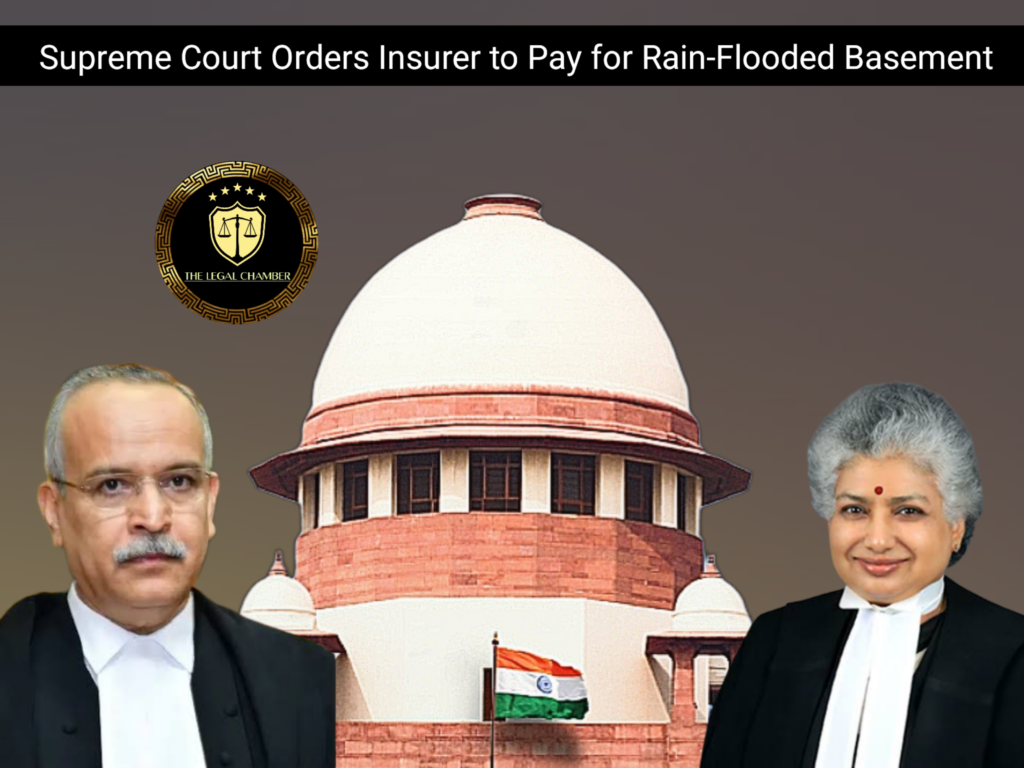
The Supreme Court held that heavy rainfall causing sudden basement flooding constitutes a covered “flood/inundation” peril under standard insurance policies, rejecting the insurer’s “seepage” exclusion. It ruled that insurers cannot arbitrarily disregard initial survey reports confirming flood damage in favor of belated contradictory assessments. The Court remanded the matter to NCDRC solely for compensation quantification under the policy terms, emphasizing objective claim evaluation aligned with contractual obligations.
Facts Of The Case:
The appellant, Gopal Dikshit, owned a property at 50, Ishwar Nagar, Mathura Road, New Delhi, insured under a ₹1.5 crore House Holder Policy (No. 2219042615P115431073) by United India Insurance for the period March 13, 2016, to March 12, 2017. During his absence from Delhi (August 24–29, 2016), heavy rainfall caused severe flooding in the basement, damaging furniture, fittings, and belongings. Upon returning on August 29, Dikshit found 3 feet of water in the basement. He installed a booster pump on August 30 but could not fully drain the water. The insurer’s first surveyor (September 3, 2016) attributed the damage to “heavy rain on August 25, 2016,” with water entering through flooring. A second surveyor (September 9, 2016) later cited “seepage” as the cause. Structural engineers confirmed the building’s instability but differed on the cause: one noted flooding due to rain, while another mentioned corrosion from seepage in structural elements (unrelated to the basement). The insurer repudiated the claim on November 23, 2016, citing “seepage” as a non-covered peril. The National Consumer Disputes Redressal Commission (NCDRC) dismissed Dikshit’s complaint in 2022, leading to this Supreme Court appeal in 2025, where flood damage was proven via initial surveys and engineering reports.
Procedural History:
The claim arose after United India Insurance repudiated Gopal Dikshit’s insurance claim on November 23, 2016, citing “seepage” as an excluded peril. Aggrieved, Dikshit filed Consumer Case No. 2287 of 2017 before the National Consumer Disputes Redressal Commission (NCDRC). The NCDRC dismissed the complaint on December 7, 2022, accepting the insurer’s “seepage” defense. Dikshit then appealed to the Supreme Court under Section 23 of the Consumer Protection Act, 1986, registered as Civil Appeal No. 6623 of 2025. The Supreme Court, in its judgment dated May 19, 2025, overturned the NCDRC’s decision, holding that the damage resulted from covered “flood/inundation” and rejecting the belated second survey report. The Court remanded the case to NCDRC solely for quantifying compensation payable under the ₹1.5 crore policy
READ ALSO : Supreme Court Upholds Life Sentence in Acid Attack Case but Reduces Term for Elderly Accused
Court Observation:
The Supreme Court observed that heavy rainfall causing sudden basement flooding constituted a covered “flood/inundation” under the insurance policy, rejecting the insurer’s “seepage” exclusion defense. It emphasized the primacy of the first survey report (06.09.2016) and corroborating engineering certificates, which conclusively established rainwater ingress as the proximate cause of damage. The Court condemned the insurer’s belated second survey (18.10.2016) as arbitrary for contradicting initial findings without justification, noting structural engineers’ reports addressing general seepage were irrelevant to the basement flooding event. Rapid water accumulation (3 feet in 3 days) was deemed inconsistent with gradual seepage, and insurers were directed to evaluate claims objectively based on factual evidence rather than technical exclusions. The ruling underscored that policy interpretation must align with proven perils when supported by contemporaneous documentation.
Final Decision & Judgement:
The Supreme Court partially allowed Civil Appeal No. 6623 of 2025, setting aside the NCDRC’s dismissal order and holding United India Insurance liable to compensate Gopal Dikshit for flood damage under his ₹1.5 crore policy. The Court rejected the insurer’s “seepage” defense, ruling that heavy rainfall caused covered “inundation” and that the initial survey report (06.09.2016) and engineering certificates conclusively proved flood damage. The belated second survey report (18.10.2016) was quashed as arbitrary for lacking justification. The matter was remanded to NCDRC solely to quantify compensation payable under the policy terms. Pending applications stood disposed, with no costs ordered.
Case Details:
Case Title:Gopal Dikshit vs United India Insurance Company Ltd. Citation:2025 INSC 731 Civil Appeal No:Civil Appeal No. 6623 of 2025 Date of Judgment:May 19, 2025 Judges/Justice Name: Hon’ble Ms. Justice B.V. Nagarathna & Hon’ble Mr. Justice Satish Chandra Sharma
Download The Judgement Here